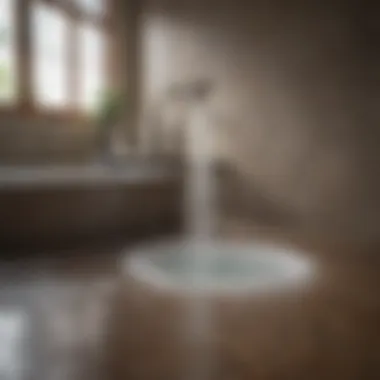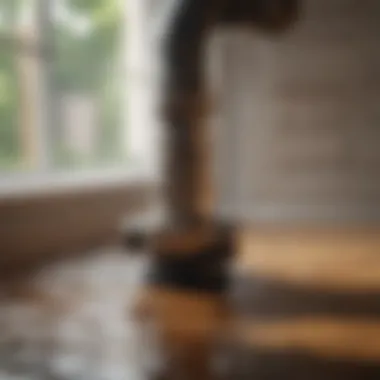Eco-Friendly Techniques for Unclogging Drains Naturally


Intro
Drain clogs can lead to inconvenient situations in any household. Dealing with these blockages, especially when they stem from natural buildup, can be quite frustrating. Fortunately, there are effective ways to tackle these problems without relying on harsh chemicals. This article dives into natural methods to unclog drains, highlighting simple home remedies and preventive measures to maintain plumbing efficiency. By understanding common blockage causes and exploring eco-friendly solutions, homeowners can ensure smoother drainage systems.
Natural drain unclogging methods not only preserve the environment but also contribute to the longevity of plumbing systems. As the usage of chemical cleaners can corrode pipes over time, opting for more gentle techniques proves beneficial in the long run. It's crucial to recognize the significance of addressing drain issues sustainably. An informed approach can enhance quality of living while minimizing potential long-term costs. Let's delve into the natural solutions available for keeping your drains clear and functional.
Understanding Drain Blockages
Understanding drain blockages is crucial when looking for effective and natural ways to unclog drains. Knowing the specifics that cause these problems can lead to successful prevention and remediation strategies. Drain blockages not only disrupt daily activities but can also lead to potential home damage if left untreated. Recognizing the underlying issues can empower homeowners to take appropriate actions before situations escalate.
Common Causes of Drain Clogs
There are several reasons drains can become clogged. Each cause may involve different materials or mechanisms, yet they all present common issues for homeowners.
- Hair and Soap Residue: Over time, hair accumulates in the drain, especially in bathrooms. When mixed with soap residue, this creates a thick mass blocking water flow.
- Food Waste: In kitchen sinks, leftover food can accumulate in the pipes. This is particularly prevalent in households that rely on garbage disposals without proper maintenance.
- Grease Buildup: Cooking grease often solidifies in cold pipes, leading to serious blockages. Disposal of grease down the sink is a major contributing factor to this issue.
- Foreign Objects: Sometimes, objects that shouldn't be in drains accidentally fall in. Items like toys or hygiene products often cause significant clogs.
- Mineral Buildup: Hard water deposits can build up over time, contributing to slow drainage and blockages.
Understanding these common causes helps establish effective prevention methods, which will be discussed in subsequent sections.
Impact of Blockages
The impact of blocked drains can extend beyond mere inconvenience. Addressing these issues swiftly can save time and reduce cost in the long term.
- Health Risks: Stagnant water from blocked drains can become a breeding ground for bacteria and harmful organisms, posing health risks to residents.
- Structural Damage: Continuous drain issues can lead to water damage, affecting walls and foundations. This can create the need for costly repairs.
- Unpleasant Odors: Clogs often result in foul smells, making living spaces uncomfortable and uninviting.
- Increased Repair Costs: Delaying action on blockages can escalate into more complicated plumbing issues, requiring professional intervention and leading to increased expenses.
- Environmental Consequences: Using harsh chemicals to clear clogs can adversely affect local ecosystems if these substances enter storm drains or groundwater.
At this stage, a clear comprehension of what causes drain blockages and their potential effects equips readers with the necessary information to effectively tackle and prevent these issues in their homes.
Benefits of Natural Solutions
Environmental Considerations
Using natural remedies for unclogging drains is highly beneficial for the environment. Traditional chemical drain cleaners often contribute to water pollution and degrading the quality of ecosystems. In contrast, natural ingredients like baking soda, vinegar, and salt are biodegradable and less harmful.
By choosing eco-friendly options, individuals can actively reduce their carbon footprint. The impact of toxic chemicals on aquatic life is a concern. When these substances enter waterways, they can disrupt local ecosystems. Natural solutions mitigate this risk and help keep waterways cleaner. Therefore, using these methods is not just a personal choice but a commitment to environmental preservation.
"Opting for natural drain solutions contributes to a healthier planet."
Health Implications
Chemical drain cleaners often contain harsh substances that can pose serious health risks. Exposure to these chemicals may result in skin irritations, respiratory issues, or other health complications. They can also be dangerous if misused or accidentally ingested, particularly in households with children or pets.
Natural methods present a safer alternative. When home remedies like baking soda and vinegar are used, they do not emit harmful fumes or create toxic residues. The non-toxic nature of these solutions promotes a healthier household environment. Beyond just preventing blockages, employing natural methods contributes to overall well-being by reducing exposure to potentially harmful substances.


Basic Tools and Ingredients
Understanding the basic tools and ingredients needed for unclogging drains is fundamental. These items not only provide the efficiency required for addresssing minor blockages, but also lay the groundwork for incorporating natural methods into one's routine. Having the right tools and ingredients on hand can significantly reduce frustration and time spent dealing with clogs. Furthermore, these tools are typically accessible in most households, thereby ensuring that immediate solutions are available.
Essential Household Items
Certain household items stand out as essential for natural drain unclogging. Baking soda is one of the most versatile and effective ingredients. It reacts with vinegar, creating a powerful fizzing action that can break down minor clogs and dissolve debris. Additionally, vinegar is another key player, known for its acidic properties which can help dissolve buildup. Apart from these, table salt plays an important role as it can draw moisture away and inhibit the growth of mold or bacteria in the drains.
Other useful tools include a rubber plunger which is perfect for creating suction, while a plumbing snake can reach deeper blockages. Having these tools readily available means that common clogging issues can be dealt with swiftly.
Key items to have:
- Baking Soda: Works effectively to dislodge blockages.
- Vinegar: A natural cleaner that has many uses.
- Salt: A simple solution for general maintenance.
- Plunger: Essential for providing suction.
- Plumbing Snake: Reaches deeper clogs effectively.
Where to Source Natural Ingredients
Finding natural ingredients for drain unclogging can be very straightforward. Most of these items can be found in regular grocery stores or even in your pantry. For instance, both baking soda and vinegar are common household staples. When searching for salt, many types may be useful, including sea salt or rock salt, which you can find in almost every supermarket.
For those who prefer more specialized products, essential oils can be sourced from health food stores or online retailers. These oils not only freshen the drain but can also serve as a preventive measure against clogs. Furthermore, biodegradable enzymatic cleaners, which break down waste using naturally occurring organisms, are also widely available.
Recommended sourcing options include:
- Local Grocery Stores: Regular items like baking soda and vinegar.
- Health Food Stores: For essential oils and natural cleaning products.
- Online Retailers: Convenient for purchasing a variety of natural cleaners and unusual ingredients.
By being prepared with the right tools and natural ingredients, one can effectively maintain drain health without always relying on professional services.
Step-by-Step Natural Drain Unclogging Techniques
Unclogging drains is a vital part of maintaining a functional household. Natural techniques are preferred by many because they are environmentally friendly and non-toxic. The following methods utilize common household products to effectively clear blockages in drains. These techniques are accessible, easy to follow, and cost-effective. By understanding these methods, homeowners can prevent future plumbing issues without relying on harsh chemicals or expensive services.
Baking Soda and Vinegar Method
This method is one of the most popular and effective ways to unclog drains. The reaction between baking soda and vinegar creates a fizzing action that can help to dislodge debris. To perform this method, first, pour about half a cup of baking soda down the clogged drain. Follow this with half a cup of vinegar. You will observe some bubbling as the ingredients react. Allow it to sit for at least 30 minutes, then flush with hot water. This process not only unclogs but also deodorizes the drain.
Salt and Hot Water Treatment
Using salt with hot water is another effective method to unclog drains. Start by boiling a kettle of water. Measure out about half a cup of salt and pour it directly down the drain. Then, pour the boiling water over the salt. The heat from the water dissolves the salt, while the combination helps to break down grease and residue that may be clogging the drain. This method can be particularly helpful for kitchen sinks that often accumulate fat and grease residue.
Using a Plunger Effectively
A plunger is a simple yet powerful tool that can resolve many drain clogs. To use a plunger, first, ensure there is enough water in the sink or tub to cover the rubber cup of the plunger. Position the plunger over the drain and use a firm but controlled motion to push down and pull up quickly. It is crucial to maintain a sealed suction to increase effectiveness. Repeat this process several times until the water begins to drain away, indicating that the clog has been cleared.


Employing a Plumbing Snake
A plumbing snake is a long, flexible tool designed to reach deep into drain pipes. To use this tool, insert the end of the snake into the drain and turn the handle clockwise. This action allows the snake to reach deeper into pipes, where clogs may be located. If you encounter resistance, continue turning the handle to break apart the clog. Once you feel the blockage loosen, carefully retract the snake while pulling out any debris it may have collected. This method can be highly effective for tough clogs that are beyond the reach of other home methods.
"Utilizing these natural and less invasive methods can lead to long-term health for your plumbing system and peace of mind for you."
By applying these step-by-step techniques, you can manage drain problems effectively. These methods also promote a sustainable approach to household maintenance.
Preventative Measures for Drain Care
Preventative measures for drain care are essential in maintaining a healthy plumbing system. Simple habits can significantly reduce the risk of drain blockages. Addressing potential issues before they escalate can save both time and money. This section explores practical tips that homeowners can incorporate into their routine.
Routine Maintenance Tips
Implementing routine maintenance is the cornerstone of effective drain care. Here are some tips to keep drains functioning well:
- Regular Cleaning: Schedule regular cleanings of your drain systems. Use natural solutions like a mix of baking soda and water or vinegar to clear minor buildups.
- Fridge Inspection: Check regularly for debris that might have fallen into kitchen sinks. Food particles are often the culprits behind clogs.
- Hair Traps: Install hair traps in bathroom sinks and tubs to catch hair before it enters the drain.
- Grease Prevention: Avoid pouring grease down kitchen drains. Instead, let it cool and dispose of it in the trash.
By practicing these small but effective tips, permanent blockages can often be prevented before they even begin.
Educating Household Members
Educating everyone in the household about proper drain usage is crucial. When all family members are aware, it leads to a more responsible approach towards drains. Here are a few strategies:
- Discuss Drain Care: Hold a meeting to discuss how the plumbing system works and the importance of drain care. This awareness can prevent careless habits.
- Establish Rules: Create simple, clear rules about what can and cannot go down the drain. Make sure that all household members understand these rules.
- Share Tips: Regularly share tips for keeping drains clear. Simple reminders about not flushing inappropriate items can be effective.
"Education is the foundation for effective prevention; understanding leads to considerate actions."
Following these preventative measures and educating household members can greatly contribute to a well-functioning drainage system. It is a proactive approach that reduces the likelihood of needing drastic measures to unclog drains later.
Alternative Natural Remedies
Alternative natural remedies offer effective solutions for unclogging drains, minimizing reliance on harsh chemicals. These methods leverage natural ingredients that are both accessible and environmentally safe. Those who seek to maintain a healthy home should prioritize these options, as they present numerous advantages over traditional chemical cleaners. With increasing awareness of the impact of pollutants on our planet, utilizing eco-friendly solutions is not only admirable but necessary.
Natural remedies can provide immediate relief for clogged drains while also assisting in the preventative care of plumbing systems. By incorporating these options as part of regular maintenance, homeowners can foster long-term drain health. This section delves into essential oils and biodegradable enzymatic cleaners as two notable alternative remedies.
Essential Oils for Drain Maintenance
Essential oils are often overlooked when considering natural remedies for drain maintenance. However, their benefits extend beyond pleasant fragrances. Oils such as tea tree, peppermint, and eucalyptus possess antimicrobial properties. These attributes make them effective in combating bacteria and odors that accumulate in drains. Tea tree oil, for instance, is renowned for its ability to eliminate residues and prevent the growth of mold and mildew.
To utilize essential oils for drain maintenance, follow these simple steps:


- Select an essential oil of your choice.
- Mix a few drops of the oil with hot water or vinegar.
- Pour the mixture down the drain.
This method not only unclogs but also leaves a refreshing scent. Regular use of essential oils can promote overall drain hygiene, reducing the frequency of clogs.
Biodegradable Enzymatic Cleaners
Biodegradable enzymatic cleaners are another excellent alternative for maintaining clear drains. These cleaners use natural enzymes that break down organic materials like hair, grease, and food particles. Unlike traditional chemical-based cleaners that can cause harm to plumbing systems and the environment, enzymatic cleaners are safe and non-toxic.
When selecting an enzymatic cleaner, it is crucial to choose a product that is reputable and designed specifically for drain cleaning. Follow these guidelines when using enzymatic cleaners:
- Read the Instructions: Each product may have specific instructions for usage.
- Apply Generously: Ensure adequate coverage in the drain to facilitate enzyme action.
- Allow Time to Work: Give the cleaner time to break down clogs, usually overnight is most effective.
With regular application, biodegradable enzymatic cleaners can significantly reduce the chances of heavy blockages and promote healthy plumbing. Their effectiveness, combined with their environmentally conscious formulation, makes them an optimal choice for drain maintenance.
When to Seek Professional Help
Sometimes, despite the best efforts with natural methods, drain blockages can persist. Recognizing when to call in a professional plumber is crucial. This decision can save time, reduce frustration, and prevent potential damage to your plumbing system. Understanding the boundaries of home remedies is key to maintaining an effective approach to drain care.
Signs of Severe Blockages
Knowing the signs of severe blockages can help determine when professional assistance is necessary. Here are a few symptoms to watch for:
- Frequent Clogs: If you find that the same drain clogs repeatedly, it could indicate a deeper issue within the plumbing system.
- Multiple Drains Affected: When more than one drain in your home is slow or clogged, the problem may reside in the main sewer line rather than individual fixtures.
- Unpleasant Odors: Foul smells coming from drains can signify trapped waste or a blockage requiring professional intervention.
- Backflow Issues: If water is backing up from a drain or causing overflows, this could mean significant blockage in the plumbing system.
- Slow Drain Rates: Drains that consistently drain slowly can indicate that a severe blockage is imminent or already present.
If any of these signs appear, it is wise to consult a licensed plumber. They can provide a thorough inspection and appropriate solutions, ensuring your drainage issues are addressed effectively.
Understanding Plumbing Systems
To better navigate plumbing issues, it is beneficial to understand how your plumbing system operates. Household plumbing is a complex network designed to transport water to and from your home. Here are several components to consider:
- Drainage System: This system directs wastewater away from your home. Blockages can disrupt its function, causing backups and overflows.
- Vent System: This part of the plumbing allows air into the drainage system, enabling wastewater to flow smoothly. Blockages can lead to pressure issues that affect drainage efficiency.
- Main Sewer Line: This line connects your home to the municipal sewer system. Severe blockages may originate here, warranting professional evaluation.
Proper understanding of your plumbing can empower you to address basic drain issues. However, significant problems often require expertise. A professional plumber can diagnose the system, identify the exact causes of blockages, and recommend targeted treatments. When in doubt, it's best to seek expertise rather than risk further complications.
Epilogue
In summary, maintaining unclogged drains through natural methods is not only achievable but also beneficial for both the environment and our health. This article has underscored the significance of recognizing common causes of blockages, such as grease accumulation, foreign objects, and organic matter. Understanding these issues can prevent future complications and provide insights into effective home remedies that utilize easily accessible ingredients.
The discussion about natural unclogging strategies highlights the potential advantages of using eco-friendly solutions. For instance, the combination of baking soda and vinegar or employing a simple salt and hot water approach effectively clears minor clogs without contributing to chemical pollutants. This aligns with broader environmental considerations, making it a responsible choice.
Moreover, by exploring preventative measures, we empower individuals to take initiative and educate those in their households. Regular maintenance and awareness can significantly reduce the frequency of drain issues, leading to a more efficient plumbing system and a cleaner living environment.
Being proactive in managing drains can also mitigate costs associated with professional plumbing services, offering long-term financial benefits. The focus should remain on sustainability while maintaining clear drains.
Natural methods to unclog drains reflect a commitment to self-sufficiency and environmental stewardship. In adopting these strategies, individuals contribute positively to their immediate surroundings and the planet.
The information provided throughout this article stresses the importance of maintaining drain health. Integrating these natural methods into your routine can enhance your living spaces and ensure a constructive approach to home maintenance.







